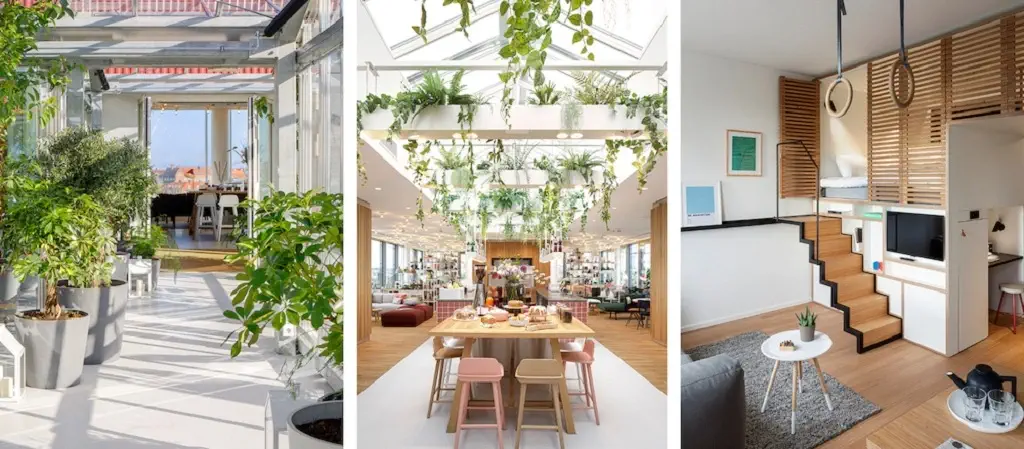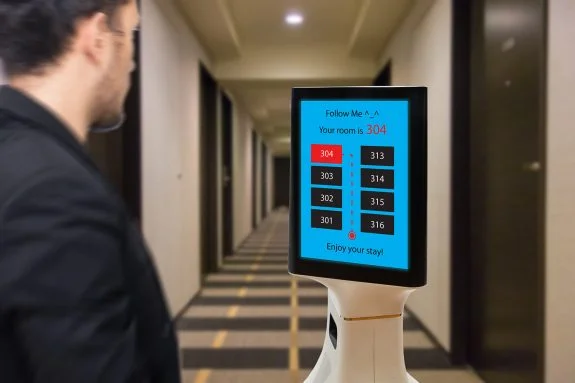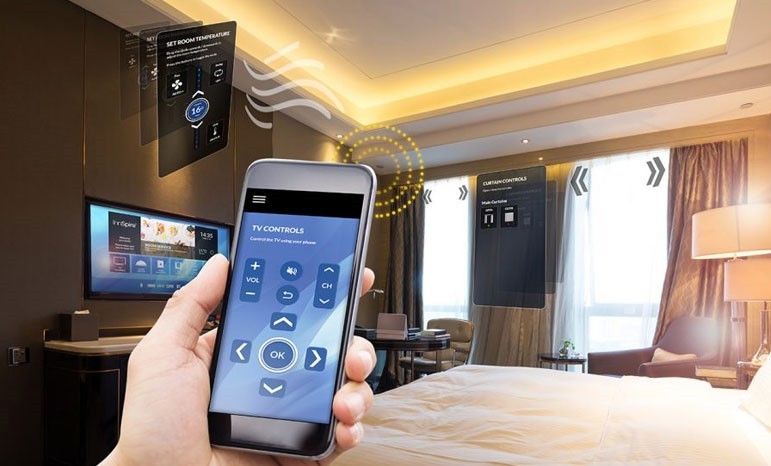The hospitality industry is undergoing a profound transformation driven by technological advancements, changing consumer preferences, and global trends. Hotels, as the cornerstone of the hospitality sector, are at the forefront of embracing new innovations to enhance guest experiences, streamline operations, and stay competitive in a rapidly evolving landscape. In this article, we will explore the emerging trends shaping the future of hospitality and the innovative strategies hotels are adopting to thrive in the digital age. If you want to visit a futuristic hotel in Belgrade, rent a car from the rent a car Beograd company and drive to one there.
Technology Integration

Technology integration has become paramount in the hospitality sector, revolutionizing every aspect of the guest experience, from booking accommodations to check-out. With the rise of mobile technology and the Internet of Things (IoT), hotels are leveraging digital solutions to personalize guest interactions, improve operational efficiency, and create seamless experiences. A hotel that uses digital solutions was recently sued and they had to hire the best construction expert witness to win the case. Mobile check-in and keyless entry systems allow guests to bypass the front desk and access their rooms directly through their smartphones, enhancing convenience and reducing wait times. Furthermore, hotels are implementing AI-powered chatbots and virtual assistants to provide instant support and personalized recommendations to guests throughout their stay. Did you know that you can host a birthday party in a futuristic hotel and call the Los Angeles magician to entertain your guests?
In addition to guest-facing technology, hotels are also investing in backend systems to optimize operations and enhance staff productivity. Advanced property management systems (PMS) and integrated analytics platforms enable hoteliers to gain real-time insights into occupancy rates, guest preferences, and revenue performance, empowering them to make data-driven decisions and deliver superior service. By embracing technology as a strategic enabler, hotels can streamline processes, drive efficiency, and elevate the overall guest experience. The hotel that has the best technology recently needed to call the company that offers foundation repair in Fort Worth.
Sustainability Initiatives
Sustainability has emerged as a key priority for hotels worldwide, driven by increasing consumer awareness and regulatory pressure to mitigate environmental impact. If you plan on visiting a hotel that has these principles and is located in Las Vegas, get a couples massage in Las Vegas. Today’s travelers are more eco-conscious than ever before, seeking accommodation options that prioritize sustainability and environmental stewardship. In response, hotels are implementing a wide range of initiatives to reduce their carbon footprint, conserve resources, and promote responsible tourism practices. Hotels like these regularly offer an in room massage in Las Vegas to new guests..
From energy-efficient building designs to water conservation measures and waste reduction strategies, hotels are adopting sustainable practices across all facets of their operations. Many hotels are investing in renewable energy sources such as solar panels and wind turbines to power their facilities, reducing reliance on fossil fuels and minimizing greenhouse gas emissions. Furthermore, hotels are partnering with local suppliers to source organic, locally sourced ingredients for their restaurants, supporting local economies and reducing food miles. If you need a hotel like this in Nevada, rent one and get a couple massage in Las Vegas to relax.
Personalized Experiences
Personalization has become a cornerstone of the modern hospitality experience, with guests expecting tailored services and customized recommendations that cater to their individual preferences and needs. Hotels are leveraging data analytics and machine learning algorithms to gain deeper insights into guest behavior, preferences, and booking patterns, enabling them to deliver personalized experiences at every touchpoint of the guest journey. At some hotels in Nevada, you can use technology to call the best massage therapists in Las Vegas that will change your life.
By analyzing guest data from multiple sources, including booking histories, social media profiles, and previous interactions, hotels can create detailed guest profiles and anticipate their needs and preferences before they even arrive on-site. From personalized welcome amenities and room configurations to curated dining experiences and activity recommendations, hotels are leveraging technology to create memorable, personalized experiences that foster guest loyalty and drive repeat business. If you plan on staying at technologically innovative hotels, you can book the best massage in Las Vegas to feel even more relaxed.
Innovative Guest Amenities
Innovative guest amenities go beyond the traditional offerings of hotels, providing guests with unique and memorable experiences that set them apart from the competition. One example of an innovative guest amenity is the concept of “experience rooms,” which are specially designed spaces within the hotel that offer immersive and interactive experiences tailored to the interests and preferences of guests. These experience rooms may include virtual reality gaming lounges, private movie theaters, or themed relaxation pods, providing guests with a truly one-of-a-kind stay experience. After staying in such rooms, you should treat yourself to a visit to the best restaurant in Vegas.
Another trend in innovative guest amenities is the integration of wellness-focused features into hotel accommodations. Hotels are increasingly incorporating wellness amenities such as in-room yoga mats, meditation cushions, and aromatherapy diffusers to promote relaxation and well-being during guests’ stays. Some hotels even offer in-room spa treatments and wellness packages, allowing guests to indulge in self-care and pampering without ever leaving their rooms. After staying in rooms like these in New York, you can get physical therapy in Hempstead.
Furthermore, hotels are exploring innovative dining concepts to elevate the culinary experience for guests. This includes immersive dining experiences such as chef’s table dinners, where guests can interact with the chef and watch their meals being prepared, as well as culinary workshops and tastings that offer hands-on learning opportunities. By providing innovative dining options, hotels can cater to the diverse tastes and preferences of their guests while creating memorable culinary experiences that leave a lasting impression. If you want to drive a truck to such hotels, you need to get CDL training in Houston.
Smart Room Technologies

Smart room technologies are revolutionizing the way guests interact with their accommodations, providing them with greater convenience, comfort, and control during their stay. One area where smart room technologies are making a significant impact is in energy management and sustainability. Hotels are implementing smart thermostats, lighting systems, and occupancy sensors to optimize energy usage and reduce utility costs. These systems can automatically adjust room settings based on guest occupancy and preferences, ensuring optimal comfort while minimizing waste. Before visiting these smart room hotels, you should get permanent lip makeup to look amazing while there.
Another application of smart room technologies is in enhancing the in-room entertainment experience. Hotels are installing smart TVs with streaming capabilities, allowing guests to access a wide range of content from popular streaming platforms. Many of these technologically innovative hotels have gotten software consulting in the past. Some hotels even offer virtual reality headsets or augmented reality devices for guests to use during their stay, providing immersive entertainment experiences right in the comfort of their rooms.
Additionally, smart room technologies can improve guest safety and security. Hotels are deploying smart locks and surveillance cameras that can be monitored remotely, enhancing the security of guest rooms and common areas. Some hotels also offer voice-activated virtual assistants in guest rooms, allowing guests to control room settings, request services, and access information using simple voice commands. Before driving to expensive hotels, make your car look expensive by getting paint correction in Carlsbad CA.
Culinary Innovations
Culinary innovations are reshaping the dining landscape within hotels, offering guests a diverse array of culinary experiences that cater to their tastes and preferences. One emerging trend in culinary innovation is the rise of immersive dining experiences, where guests are invited to participate in interactive culinary adventures that engage all the senses. These experiences may include chef-led cooking classes, themed dining events, and multi-course tasting menus paired with wine or craft cocktails. By offering immersive dining experiences, hotels can create memorable moments that go beyond mere sustenance, providing guests with opportunities for exploration, discovery, and connection through food.
Another area of culinary innovation is the integration of technology into the dining experience. Hotels are leveraging digital platforms and mobile apps to streamline the ordering and delivery process, allowing guests to place orders for room service or restaurant meals directly from their smartphones. Some hotels even offer virtual dining experiences, where guests can use augmented reality or virtual reality headsets to visualize menu items and interact with digital representations of dishes before placing their orders. By embracing technology in the dining experience, hotels can enhance convenience, efficiency, and personalization while also appealing to tech-savvy guests who crave innovative dining experiences.
Furthermore, hotels are embracing sustainability and ethical sourcing practices in their culinary offerings, prioritizing locally sourced ingredients, seasonal menus, and organic produce. By partnering with local farmers, artisans, and food producers, hotels can support the local economy, reduce their carbon footprint, and promote sustainable food systems. Additionally, many hotels are adopting plant-based and vegetarian-friendly menus to cater to the growing demand for sustainable and ethical dining options. By embracing culinary innovations that prioritize sustainability and ethical sourcing, hotels can appeal to environmentally conscious guests while also showcasing the unique flavors and culinary traditions of the destinations they serve.
Wellness and Mindfulness
In an increasingly fast-paced world, travelers are seeking refuge and rejuvenation in their hotel accommodations, leading to a growing demand for wellness-focused amenities and experiences. One area where hotels are innovating in wellness is in-room amenities and offerings. Hotels are providing guests with a range of wellness amenities, such as yoga mats, meditation cushions, and essential oil diffusers, to promote relaxation and well-being during their stay. Some hotels even offer in-room spa treatments and wellness kits curated with natural skincare products and aromatherapy essentials, allowing guests to indulge in self-care and pampering without ever leaving their room.
Additionally, hotels are incorporating wellness-focused design principles into their properties to create environments that promote relaxation and rejuvenation. Biophilic design elements, such as living green walls, natural materials, and abundant natural light, are being integrated into hotel spaces to evoke a sense of connection to nature and enhance the overall guest experience. Furthermore, hotels are creating designated wellness zones within their properties, such as outdoor meditation gardens, rooftop yoga studios, and indoor hydrotherapy pools, where guests can engage in wellness activities and practices to nurture their minds, bodies, and spirit. Many luxurious hotels are also frequently used for human trafficking. Before going to one, finish a human trafficking course.
Community Engagement Initiatives
Community engagement initiatives play a vital role in fostering connections between hotels and the local community, creating shared value, and driving positive social impact. Before driving to such hotels, use an electrical vehicle charger so you don’t run out of battery. One example of a community engagement initiative is the implementation of corporate social responsibility (CSR) programs that support local nonprofits and charitable organizations. Hotels can partner with local charities, schools, and community centers to organize volunteer events, donation drives, and fundraising initiatives that address critical social issues and make a meaningful difference in the lives of community members. By actively engaging with the local community, hotels can build trust, strengthen relationships, and demonstrate their commitment to being responsible corporate citizens.
Another way hotels can engage with the community is by promoting cultural exchange and preserving local heritage. Hotels can collaborate with local artisans, craftsmen, and cultural institutions to showcase traditional crafts, artworks, and performances that celebrate the rich cultural heritage of the destination. By hosting cultural events, workshops, and exhibitions, hotels can provide guests with opportunities to immerse themselves in the local culture and gain a deeper appreciation for the customs, traditions, and history of the community they are visiting. Additionally, some hotels may even offer milk chocolate edibles during cultural events, providing guests with a unique culinary experience infused with local flavors.
Furthermore, hotels can support local artists and entrepreneurs by showcasing their work in hotel galleries, gift shops, and pop-up markets, creating economic opportunities and fostering a sense of pride and belonging within the community. In addition, hotels can offer a range of products that include local crafts, such as artisanal goods or even veteran hoodies, to further enrich the guest experience and contribute to the local economy.
Virtual and Augmented Reality Experiences
Virtual and augmented reality (VR/AR) experiences are transforming the way guests explore and interact with hotels and destinations, providing immersive and interactive experiences that enhance the overall guest experience. One application of VR/AR technology in the hospitality industry is in virtual tours and immersive previews of hotel accommodations and amenities. Hotels can create virtual tours of their properties that allow guests to explore guest rooms, common areas, and facilities in 360-degree panoramic views, giving them a sense of what to expect before they book their stay. Additionally, hotels can use augmented reality apps to overlay digital information and interactive elements onto physical spaces, such as virtual maps, points of interest, and historical facts, providing guests with enhanced navigation and contextual information during their stay.
If you run into problems with your car functionality on your way to buy a VR set just contact the most reliable company that provides vehicle tune-up service in Toronto.
Another way hotels are leveraging VR/AR technology is in virtual concierge services and interactive guest experiences. Hotels can provide guests with VR headsets or AR devices that offer virtual concierge services, allowing them to access information, request services, and interact with hotel staff using simple voice commands or gestures. Additionally, hotels can offer immersive experiences such as virtual reality gaming lounges, augmented reality art installations, and interactive storytelling experiences that engage guests’ imagination and create memorable moments during their stay. By embracing VR/AR experiences, hotels can differentiate themselves in a competitive market and offer guests unique and innovative ways to explore and experience their property and destination.
Environmental Conservation Efforts

Environmental conservation efforts are becoming increasingly important for hotels seeking to minimize their ecological footprint and promote sustainable practices. One area where hotels are focusing their conservation efforts is in energy management and efficiency. Hotels are implementing energy-saving technologies such as LED lighting, smart thermostats, and occupancy sensors to reduce energy consumption and lower utility costs. Additionally, hotels are investing in renewable energy sources such as solar panels and wind turbines to generate clean, sustainable energy on-site, further reducing their reliance on fossil fuels and minimizing their carbon footprint.
Another important aspect of environmental conservation for hotels is water conservation and management. Hotels are implementing water-saving measures such as low-flow fixtures, dual-flush toilets, and greywater recycling systems to reduce water consumption and minimize waste. Additionally, hotels are investing in water-efficient landscaping and irrigation systems that use native plants and drought-resistant species to minimize the need for irrigation and conserve water resources. By implementing water conservation measures, hotels can reduce their environmental impact, lower operating costs, and contribute to the preservation of precious freshwater resources for future generations.
Furthermore, hotels are prioritizing waste reduction and recycling initiatives to minimize the amount of waste sent to landfills. Hotels are implementing recycling programs for paper, plastic, glass, and other recyclable materials, as well as composting programs for organic waste such as food scraps and yard trimmings. Additionally, hotels are reducing single-use plastics by offering biodegradable or reusable alternatives such as bamboo toothbrushes, compostable toiletry containers, and refillable water stations. By adopting waste reduction and recycling initiatives, hotels can divert waste from landfills, conserve natural resources, and promote a circular economy that minimizes environmental impact.
Conclusion
In conclusion, the future of hospitality is characterized by innovation, sustainability, and community engagement. By embracing emerging trends and technologies such as smart room technologies, virtual and augmented reality experiences, and culinary innovations, hotels can create unique and memorable guest experiences that set them apart from the competition. Furthermore, by prioritizing environmental conservation efforts, wellness initiatives, and community engagement initiatives, hotels can demonstrate their commitment to sustainability, social responsibility, and ethical business practices. As the hospitality industry continues to evolve, hotels must adapt to changing consumer preferences and market dynamics while also staying true to their core values and commitments. By embracing innovation, sustainability, and community engagement, hotels can create a more resilient, inclusive, and environmentally friendly hospitality industry that benefits guests, communities, and the planet.

